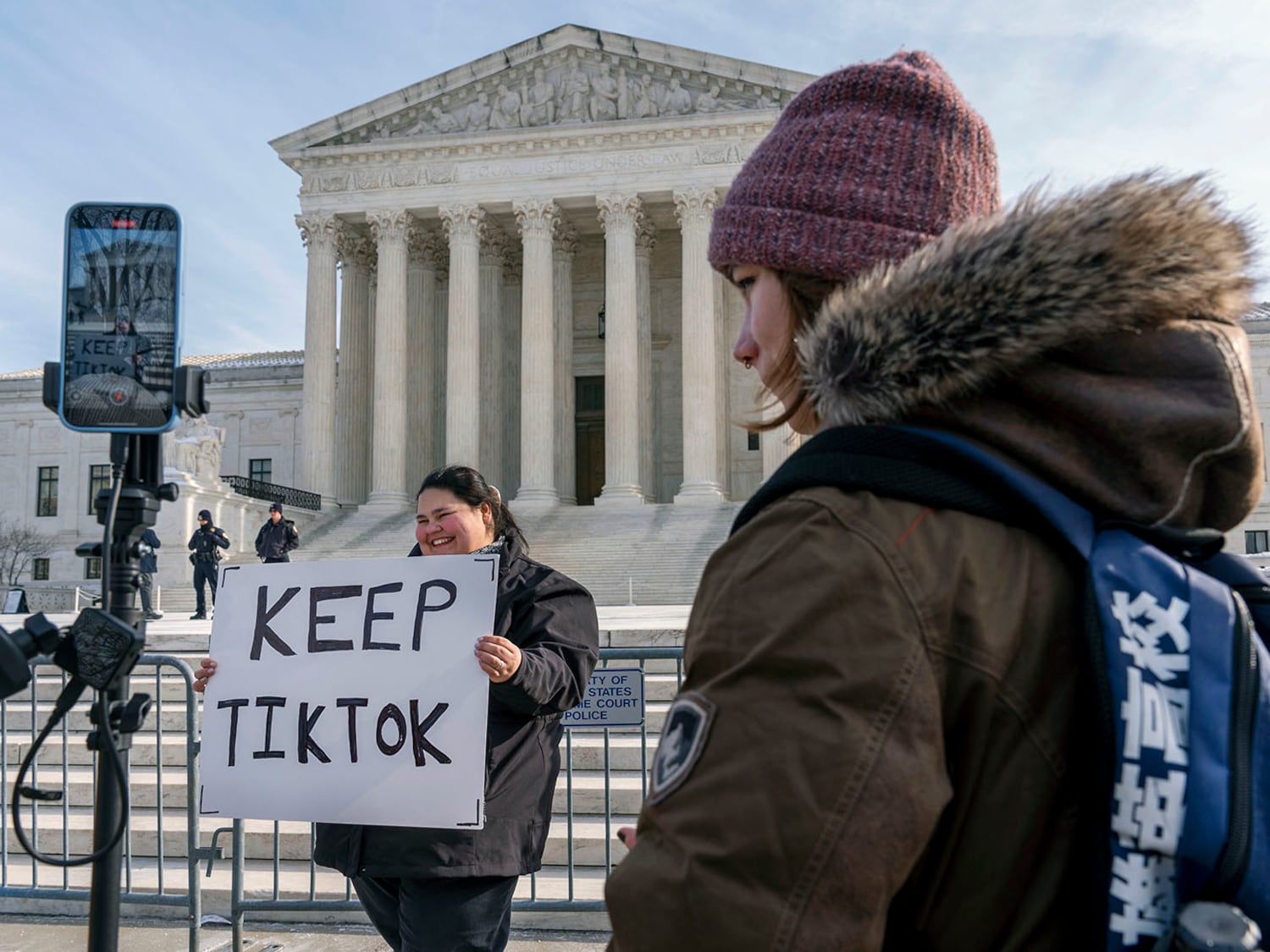TikTok lawyers ask Supreme Court to delay ban
Trump opposes a bipartisan law banning TikTok, which is set to take effect the day before his inauguration.

WASHINGTON - Lawyers for Chinese-owned TikTok asked the Supreme Court on Friday to postpone any enactment of a law that would ban the popular social media app in the United States on Jan. 19, the day before President-elect Donald Trump takes office.
U.S. President Joe Biden in April signed a bipartisan bill that gave TikTok’s Chinese parent company ByteDance 270 days to sell the app due to concerns that China’s government was using TikTok both to collect sensitive data about Americans and feed them propaganda.
In 2020, Trump signed a similar executive order that was overturned by the Supreme Court, but he reversed his stance in the lead up to the 2024 presidential election. Last month, he asked the Supreme Court’s justices to delay the Jan. 19 deadline until after his inauguration.
In court on Friday, lawyers for TikTok asked for the same, noting that the difference of just one day could allow for a situation in which Trump “exercises his authority to extend” the deadline for the sale of TikTok, which claims 170 million individual users in the United States.
“On Jan. 19, we still have President Biden, and on Jan. 19, as I understand it, we shut down,” said Noel Francisco, an attorney representing both TikTok and ByteDance, in his argument.
“It is possible that come Jan. 20th, 21st, 22nd, we might be in a different world,” he said. “It makes perfect sense to issue a preliminary injunction here, and simply buy everybody a little breathing space.”
Asked what he meant by “shut down,” Francisco said that TikTok would be removed from the Apple App Store and Google Play Store.
Associate Justice Amy Coney Barrett pressed Francisco, noting that the law allowed TikTok to continue operating in the United States after Jan. 19 if it was sold to an American company, nullifying the concerns of Congress about its potential misuse by the Chinese Communist Party.
“You keep saying ‘shut down.’ The law doesn’t say TikTok has to shut down. It says ByteDance has to divest. If ByteDance divested TikTok, we wouldn’t be here, right?” she said. “That would be fine, right?”
Francisco said ByteDance would not sell the “underlying source code” that drives TikTok’s recommendation algorithm because of its value.
RELATED STORIES
TikTok CEO denies links to Chinese Communist Party
TikTok promotes pro-China bias on Tibet, Taiwan, Uyghurs: study
TikTok deletes videos related to Uyghur human rights violations
White House backs TikTok ban bill
Such an algorithm could take “many years to reconstruct” by an independent U.S.-owned TikTok, he said, and would force the popular app to become a “fundamentally different platform” promoting content differently, thereby violating the U.S. subsidiary’s free-speech rights.
TikTok’s lawyers are also seeking to ultimately overturn the law on free speech grounds, arguing a ban violates the Constitution.
First Amendment case
American lawmakers have argued that TikTok represents a unique national security threat because Chinese national security laws require companies in the country to secretly comply with Beijing’s directives.
That means China’s government could compel ByteDance to change TikTok’s algorithm to surreptitiously prioritize Chinese propaganda in the feeds of American users, they say, or force TikTok to compile profiles about the vices of potential American espionage targets.

But lawyers for TikTok content creators in the Supreme Court on Friday said that their clients had built lives and businesses around TikTok’s powerful algorithm and were concerned about losing access to it.
Jeffrey Fisher, a Stanford University law professor representing Texas rancher and popular TikTok content creator Brian Firebaugh, argued Americans “have a right to work with the publisher of their choice” and that the law’s national security concerns were not sufficient.
“Under the First Amendment, mere ideas do not constitute a national security threat. Restricting speech because it might sow doubt about our leaders or undermine democracy are the kind of things our enemies do,” Fisher said. “It is not what we do in this country.”
However, the Supreme Court justices appeared skeptical.
Associate Justice Clarence Thomas quizzed the merits of a First Amendment case against a law ultimately aimed at foreign ownership, noting China’s government did not have the rights of a U.S. citizen.
“It doesn’t say anything about creators,” Thomas said. “It’s only concerned about the ownership, and the concerns that data will be manipulated, or that there will be other national security problems with someone who’s not a citizen … or a company that’s not here.”
Chief Justice John Robert made a similar case.
“Congress doesn’t care about what’s on TikTok. They don’t care about the expression; that’s shown by the remedy,” Roberts said, referring to the provision allowing TikTok to continue if ByteDance divests.
“They’re not saying Tiktok has to stop. They’re saying the Chinese have to stop controlling TikTok. So it’s not any direct burden on the expression. Congress is fine with the expression,” he added.
“They’re not fine with a foreign adversary … gathering all this information about the 170 million people who use TikTok.”
National security case
The justices also grilled U.S. Solicitor General Elizabeth Prelogar’s argument that the legislation should not be overturned because it was aimed at China’s potential for “covert content manipulation.”
Associate Justice Elena Kagan said that she could not understand the government’s focus on the potentially “covert” manner of the algorithm manipulation by ByteDance, noting that all social media platforms were “blackboxes” that delivered content in seemingly obscure ways.
“You get what you get and you think ‘That’s puzzling,’” Kagan said to laughter. She added that millions of Americans willingly used TikTok even though they were aware of its ultimate ownership.
“If you just mean that what’s covert is that China is behind it,” she said, “well, everybody does know now that China is behind it.”
Prelogar said that the issue was that Beijing had the capability to suddenly launch an “influence campaign” on half of the U.S. population through TikTok without anyone knowing it was happening.
Many of TikTok’s users were also teens, she noted. They may have few concerns now about their data being used by China to build profiles on them, but could one day be in positions of influence in the military, business or government and become targets of espionage.
In any case, she argued, the bipartisan law passed by Congress and signed by Biden did not violate the Constitution and should stand.
“It’s not saying you can’t have pro-China speech [or] you can’t have anti-American speech,” she said. “It’s not regulating the algorithm.”
“TikTok, if it were able to do so, could use precisely the same algorithm to display the same content,” she said. “All the act is doing is trying to surgically remove the ability of a foreign adversary nation to get our data and to be able to exercise control over the platform.”
The Supreme Court adjourned the case to Monday.
Edited by Malcolm Foster.
This article has been sourced from various publicly available news platforms around the world. All intellectual property rights remain with the original publishers and authors. Unshared News does not claim ownership of the content and provides it solely for informational and educational purposes voluntarily. If you are the rightful owner and believe this content has been used improperly, please contact us for prompt removal or correction.







/cloudfront-us-east-1.images.arcpublishing.com/gray/RDUJBOYFCBAXRCGGFYQPQNOF5Q.jpg)



